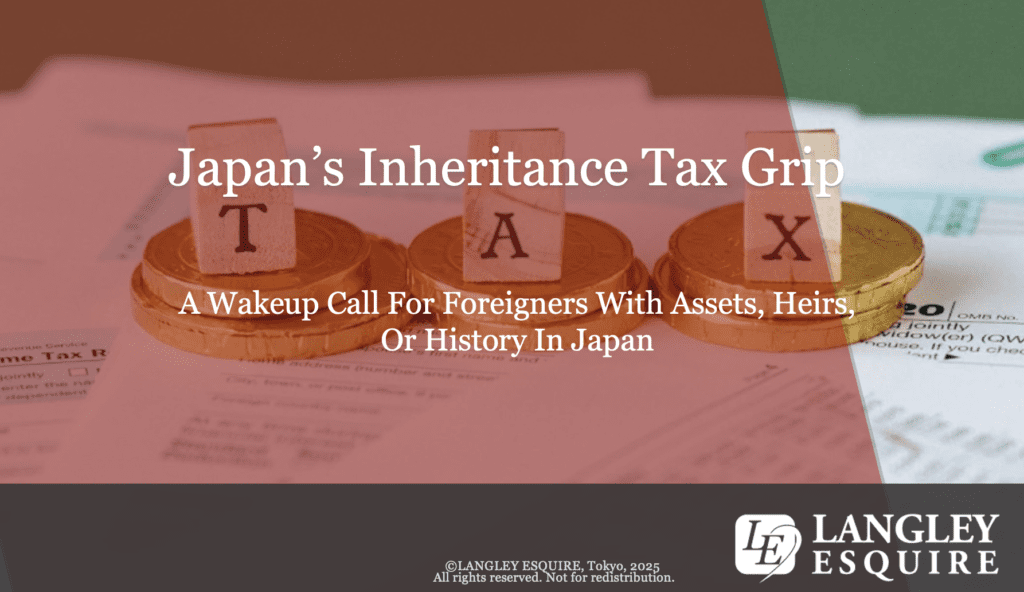
A wake-up call for foreigners with assets, heirs, or history in Japan
Introduction: A Law Few Understand — Until It’s Too Late
Japan’s inheritance system is often viewed as a model of order — rooted in the Civil Code and wrapped in cultural reverence for family lineage. But for foreigners living in Japan, marrying into Japanese families, or holding property here, it can feel anything but orderly. In fact, it’s often a legal ambush.
Few realize how aggressively Japan asserts its right to tax your estate — even after you’ve left the country, even if your heirs are non-Japanese, and even if the assets are entirely abroad. With one of the highest inheritance tax rates in the world — up to 55%, Japan can claim a surprising reach over your estate, triggered by rules that many foreigners have never even heard of.
The result is frozen accounts, massive tax bills, legal limbo. All unfolding just as a grieving family is trying to make sense of a loss. For years.
This article outlines how the system works, why you as a foreigner might be especially vulnerable, and what you can do now to protect your family and legacy.
How Inheritance Works in Japan: The Civil Code in Action
At its core, Japan’s system is statutory, with little room for improvisation:
- If you die without a will, the law distributes your estate by a specific formula:
– Spouse + 1 child → 50/50
– Spouse + 2 children → 1/3 to spouse, 1/3 each to children
– No spouse → children, parents, or siblings, in that order. - Even if you have a will, close relatives — including children born out of wedlock — can claim their minimum statutory share (iryūbun) regardless of your stated wishes.
- All estates must pass through Family Court, which adds layers of paperwork and official translation when foreign parties / foreign wills are involved.
- The process is based on the koseki (Japanese family registry) system, often a stumbling block for mixed-nationality families or international heirs.
Case Study: When a Foreign Will Isn’t Enough
Take David, a long-time foreign resident in Japan. He dies with a valid will, written in English and notarized in his home country.
But that will isn’t automatically accepted. His spouse must have it translated, certified, and submitted to Family Court. Meanwhile, the bank freezes his accounts, authorities suspend real estate transfers, and David’s adult children from a previous marriage show up to claim their share (which they will receive).
Then comes the tax authority — asserting its right not only to his Tokyo condo but also to his foreign bank accounts and property overseas.
Legal chaos, family conflict, and a sizable tax bill — all on top of David’s death.
Making a Will in Japan: What Foreigners Should Know
Japan recognizes three types of wills:
- Holographic — handwritten in Japanese, signed, and dated.
- Notarized (kōshō-sho) — the most secure, prepared with a Japanese notary or dictated to a bengoshi.
- Sealed (mippi-sho) — sealed and submitted to a notary. It is opened after death (this is the process I generally follow)… otherwise known as the “secret will”.
As a foreigner, a Japanese notarized will is a must not only for Japanese assets and for those beyond, too.
If you have global assets, your will must account for different jurisdictions where other assets may be located (when you finally die). It should be coordinated to avoid contradictions or unintentional double taxation. It is a complicated and delicate process because obviously you are not dead yet and assets can fall into (or out of) your estate between the time you write your last will & testament and the time you actually die.
Even a valid will may not override the legal rights of heirs under Japan’s statutory system.
The Tax Trap: Global Reach and the 10-Year Rule
Here’s the kicker: under Japan’s Inheritance Tax Act, your entire global estate may be subject to Japanese tax if:
- You were a Japanese resident within 10 years of your death,
- Or your heir is a Japanese resident at the time of inheritance.
So even if you move back home and die five years later, Japan may still tax everything — simply because your spouse or child still lives in Tokyo.
Japan’s top inheritance tax rate is 55%, and the basic exemption is modest: ¥30 million + ¥6 million per heir.
If you’re from a country without a bilateral tax treaty, you may face double taxation — Japan first, then your home country.
Why Trusts Don’t Work (Like You Think) in Japan
In the U.S. and in other places, trusts are the go-to strategy for inheritance planning. In Japan? Not so fast.
Japan’s tax authorities often do not recognize foreign trusts as a way to shield assets from inheritance tax. Even if a trust was established abroad, the assets inside may still be subject to taxation as part of your estate. This is particularly the case Japanese residents are beneficiaries.
Domestic “trust-like” vehicles exist in Japan, but they are complex, restrictive, and often unsuitable for foreigners.
In short: don’t assume your U.S. or UK-style trust will protect you here.
So What Can You Do?
Here are six real-world strategies that work in Japan — with caveats:
- Make a Valid Japanese Will
Have a notarized will, harmonized with your overseas documents. - Understand the 10-Year Rule
Don’t assume you’re off the hook when you leave Japan — timing matters. - Strategic Lifetime Gifting
Japan allows limited tax-free gifts — ¥1.1 million/year per recipient — but large gifts may trigger gift tax. - Use Insurance
Life insurance can create liquidity to pay inheritance tax — it’s what most Japanese families do. - Joint Ownership
Can simplify transfer but often triggers gift tax if improperly structured. - Plan for Liquidity
Your heirs have 10 months to pay. If the estate is tied up in real estate, they may be forced to sell under pressure.
Cultural Reflection: The Garden Tax and the Shrinking Home
Walk through almost any Tokyo neighborhood and you’ll notice something odd: tiny gardens, awkward garages, and homes crammed together with no clear design, little space in between them.
This wasn’t always the case.
Here’s what happened:
When Dad dies, everything passes to Mom — no tax yet. But when Mom dies, the son inherits the property — and faces a steep inheritance tax.
His solution? Chop off the garden, build a cheap apartment block, sell or lease it, use the cash to pay tax — and live in what’s left.
Repeat this across neighborhoods for decades, and you get today’s Tokyo (and elsewhere):
no gardens, no garage doors, no aesthetic cohesion — just functional shrinkage.
Even the garages don’t fit cars anymore. Outside windows have awkward alcoves, the car’s nose poking out like an ignored dog in a yard. It is really contrary to what you would expect, given Japan’s famous attention to other aesthetics.
Rokubancho: A Samurai Workaround
In my own neighborhood — Rokubancho in Yotsuya, within the third moat of old Edo Castle — you’ll see a different pattern.
Once home to upper-ranking samurai, this neighnorhood is polulated with buildings of enormous footprints. But the trick is subtle: you’ll see office buildings and towers, yet hear the laughter of children and spot signs of family life.
Why?
Because landowners who required quarters for retainers, a family home they have to keep in the capital, a barn for horses, a proper Japanese garden with flowing water, a pond, some massive rocks, a separate tea house —these heirs of old families eventually struck deals after paying years of tax bills.
Clever real-estate developers built 12- or 16-story towers. In return, the original landowners received custom-built penthouses — rent-free, some with rooftop gardens, patios, and hot houses. They remain hidden from view, passed down through generations. You can only see them from the vantage point of a taller building… they are everywhere!
It’s clever. Legal. And sustainable — if you plan ahead (and a Member of that gentried class).
You’ll see similar arrangements in cities across Japan now that you know what to look for.
The Akiya Effect: Where Inheritance Meets Urban Blight
One striking consequence of Japan’s rigid inheritance rules is the growing number of abandoned homes — akiya. There are now an estimated 8.5 million akiya across Japan — about 14% of all residential properties! These are often inherited homes in declining rural areas or older city neighborhoods, left unoccupied because heirs cannot afford — or simply don’t want — the tax, upkeep, or renovation costs. Many still belong on paper to someone who has died or whose heirs are participating in legal disputes. Others legally belong to heirs living abroad or in Tokyo who have no intention of returning. In some cases, disputes among siblings, missing family registry documents, or lack of liquidity to pay inheritance taxes prevent the heirs from selling the home, live in it, or tear it down.
Rather than just a real estate problem, it’s a legacy of the inheritance system itself. And it’s not just happening in the countryside. During my early years in Tokyo in the 1980s, I vividly remember thatched-roof samurai manors quietly decaying — one near the Okura Hotel and several in Rokubancho. Majestic, empty, unclaimed. They’re all gone now. Replaced by apartment towers and sterile cookie-cutter condominiums.
Akiya has become a defining symptom of demographic and policy failure. And now, an unlikely new demographic is showing interest: foreigners.
Across Japan, especially in picturesque or historic districts, foreign buyers are seeking out akiya as personal renovation projects — an adventure, a bargain, a story. Some succeed and help revitalize forgotten corners of Japan. Others fall prey to unlicensed brokers, title confusion, or crumbling structures with massive hidden liabilities. It’s a Wild West of rural real estate. This is possible by the combination of inheritance law, aging population, and tax burdens.
In fact, the akiya issue — and the speculative market emerging around it — is arguably Japan’s most visible inheritance problem. I mean that and garages that don’t ‘fit’.
Conclusion: Don’t Wait Until It’s Too Late
Japan’s inheritance system isn’t just complex — it’s deeply personal. And it’s dangerous for those who don’t know the rules.
Foreigners are often caught off guard. But this doesn’t have to be you.
Even though you may not be able to change the law on your own, you can prepare. You can protect your family. You can talk to someone who knows the system, someone who has your back.
Langley Esquire has been helping foreigners in Japan write valid wills and plan estates for years. If you’re ready to get ahead of this, give us a call.
Are you familiar with “Tokyo on Fire”? Episodes are available on YouTube “Langley Esquire”: excruciatingly-gained insights sifted over 40 years in-country! Entertainingly presented.
“Japanese Politics One-on-One” episodes are on YouTube “Japan Expert Insights”.
If you gain insight from these briefings, consider a tailored one for your Executive Team or for passing-through-Tokyo heavyweights.
To learn more about advocacy in Japan, read our article “Understanding the Dynamics of Lobbying in Japan.”
Join the Success!
Experience exceptional, personalized solutions designed to meet your business’s specific needs. Discover how we can elevate your operations to the next level.




